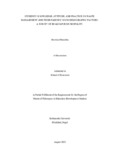
Please use this identifier to cite or link to this item:
https://hdl.handle.net/20.500.14301/535| Title: | Students’ Knowledge, Attitude, and Practice on Waste Management and their Parents’ Socio Demographic Factors: A Survey of Bhaktapur Municipality.[Unpublished MPhil Disertation]. |
| Authors: | Dhanchha, Shrutina |
| Citation: | Dhanchha, S.(2025).Students’ knowledge, attitude, and practice on waste management and their parents’ socio demographic factors: A survey of Bhaktapur municipality. |
| Issue Date: | Aug-2025 |
| Publisher: | Kathmandu University School of Education |
| School: | SOED |
| Department: | DODE |
| Level: | M.Phil. |
| Program: | MPhil in Development Studies |
| Abstract: | Management of household waste in Nepal is still a major concern and is leading to public health risks and environmental degradation. While school-based education and awareness campaigns contribute to the formation of sustainable behaviour, the impact of parental influence remains unacknowledged. This study explores the relationship between the socio-demographic and cultural background of parents and their children's Knowledge, Attitude and Practice (KAP) in household (HH) waste management. It focuses on parents’ function as enablers and role models in the establishment of sustainable behaviour among the children. A quantitative study using a structured KAP survey was performed among students from grades 11 and 12 across six public schools in Bhaktapur Municipality. To ensure representation of grade and gender, stratified random sampling was chosen. The survey questionnaires, grounded in environmental education theory and KAP models, were pilot tested and validated with strong internal consistency. Ethical standards were maintained through informed consent and data confidentiality. Descriptive analysis was used to assess the KAP level. Furthermore, to examine the influence of socio-demographic, demographic and parental characteristics on students’ KAP, chi-square tests and logistic regression were applied. This approach within a post-positivist paradigm ensured empirical rigour and contextual relevance. The study found that while students exhibited positive attitudes toward household waste management, their levels of knowledge and practice varied. Female students had significantly higher knowledge of reuse, more positive attitudes, and greater engagement in waste segregation practices than males. Students from joint families showed significantly higher knowledge of segregation and overall knowledge. Logistic regression showed that households with male waste managers were significantly less likely to have recycling knowledge than those led by females. The households that receive remittances are less likely to have a positive attitude toward waste segregation. Furthermore, households living with family are more likely to practice better overall waste management. The study suggests integrating household and school-based programs with parental involvement, gender-sensitive approaches and behaviour, and the revitalization of indigenous waste practices such as composting to promote sustainable waste management among future generations. |
| URI: | https://hdl.handle.net/20.500.14301/535 |
| Appears in Collections: | Dissertations |
Files in This Item:
| File | Description | Size | Format | |
|---|---|---|---|---|
| Shrutina Dhaanchha 2025 08 20.pdf | 1.82 MB | Adobe PDF |  View/Open |
Items in DSpace are protected by copyright, with all rights reserved, unless otherwise indicated.